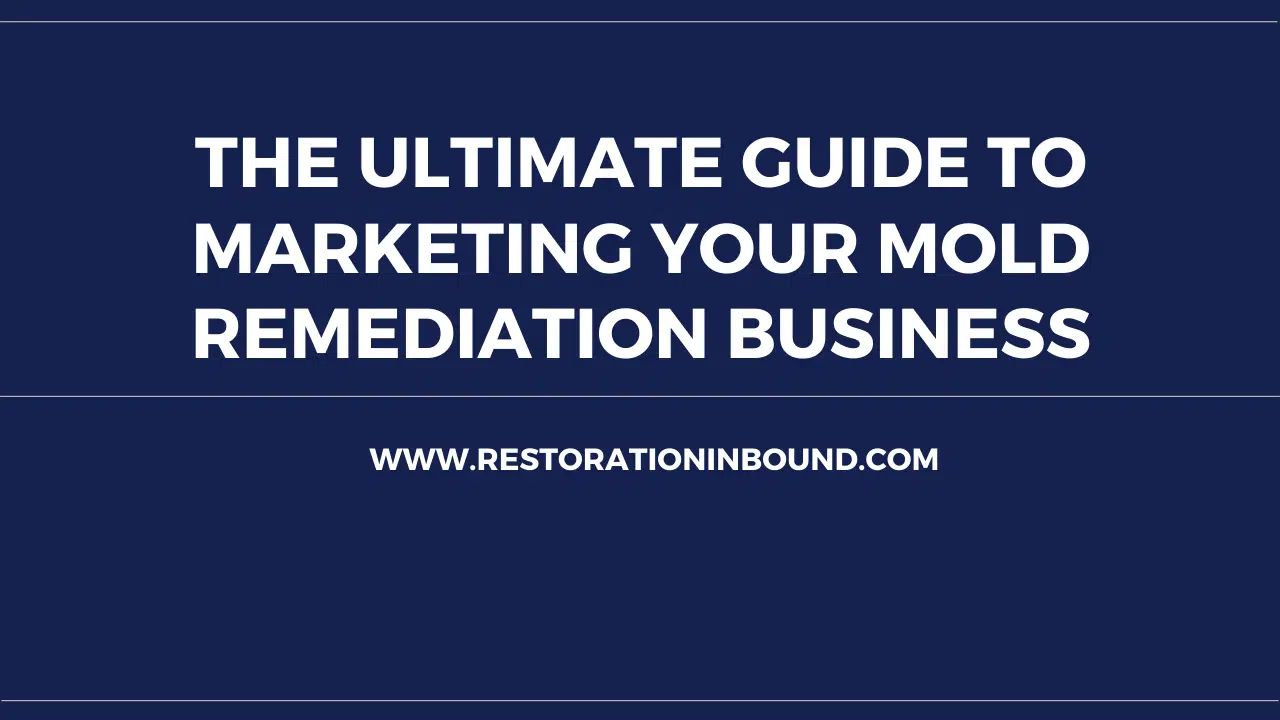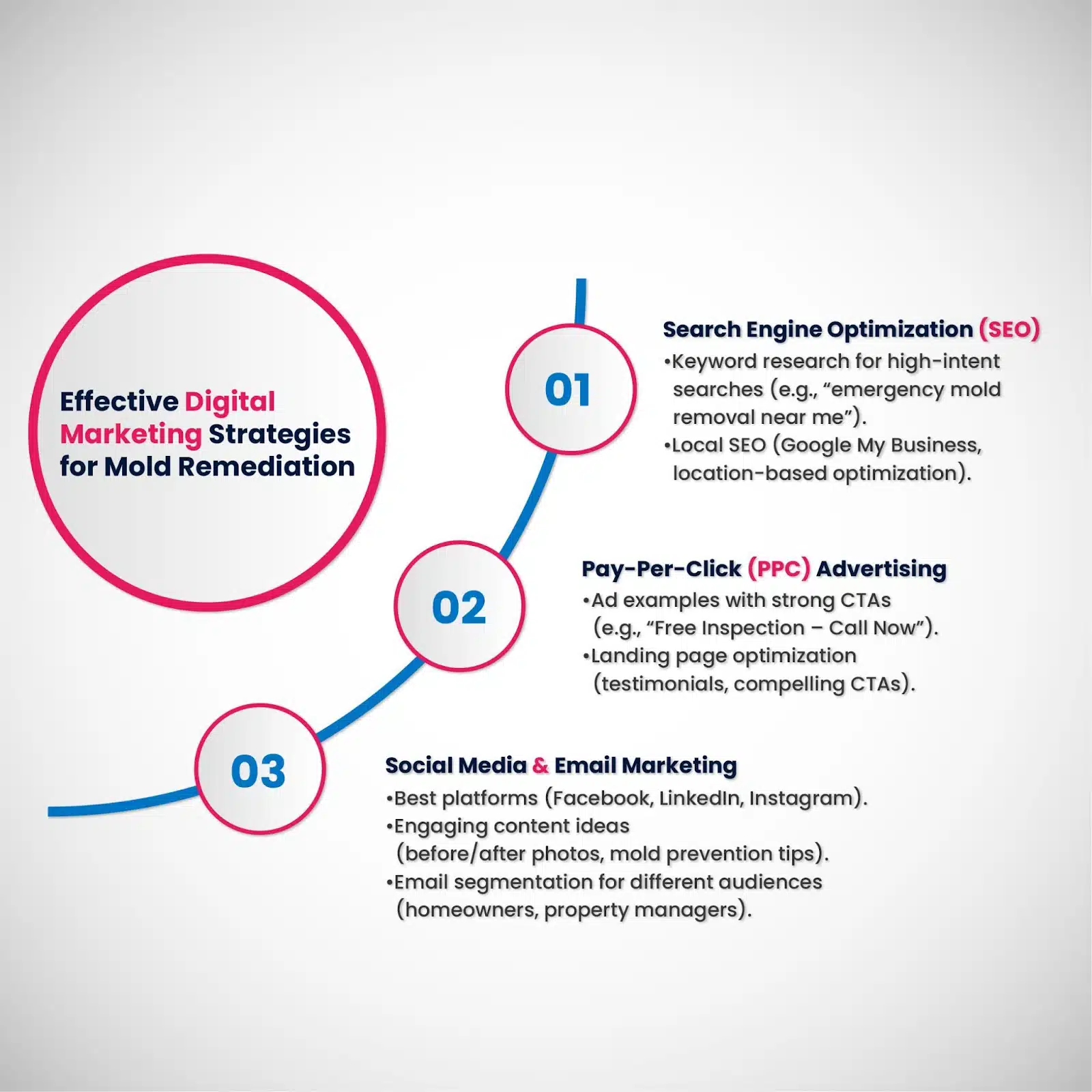Last Updated on June 18, 2025 by Hayk Saakian

In the current competitive environment, it is crucial to market your mold remediation company to ensure a long-term growth and profitability. To differentiate yourself from the competition, one will have to understand the market, target customers, and use both digital and traditional marketing tactics to increase their mold remediation business.
This guide breaks down all the strategies that will help you build a solid brand identity, extend your reach, and generate more leads.
Understanding Your Market and Business Landscape
To successfully market your mold remediation business, firstly, you will need to understand the general market and business environment. You will need to understand industry trends, customer demands, regulatory requirements, and your competitors before developing any plan.

Assessing the Demand for Mold Remediation
Mold removal is an important service because it raises health concerns among individuals. Apart from health concerns, it also causes damage to properties because of excessive growth. So, there are various factors that affect the demand for mold removal services.
For example, humid locations and areas with frequent water damage will experience greater demand. Similarly, rental homes and home sales also require mold inspections and remediation when tenants leave.
Identifying and Segmenting Your Ideal Customers
Before you develop a marketing plan, it is important to know your target customers and segment them into various groups based on their needs and expectations. You can offer these services to both residential and commercial customers, but each of them have different reasons.
Homeowners are mostly interested in their family’s health and property value. They require efficient, affordable solutions with good explanations.
On the other hand, companies, landlords, and property managers look for speedy, compliant, and professional mold remediation to protect their tenants and customers.
Identifying these main customer segments will help you design targeted marketing campaigns that resonate with their specific pain points.
Analyzing Your Competitors
Understanding your competitors will help you position your mold remediation company effectively. Competitor research will help you identify market gaps and opportunities which you can target.
Analyze your direct competitors (companies that provide mold remediation services in your local area, with similar services) and indirect competitors (General cleaning or contracting services, who offer mold removal as an additional service).
To find your competitors, you can use tools such as Google search, social media, and review sites to compare competitors’ offerings, price points, and customer reviews. Now in a competitive marketplace, you have to differentiate by focusing on your unique selling points.
- Faster Service: Provide 24/7 emergency mold removal.
- Eco-Friendly Solutions: Promote non-toxic, environmentally friendly mold remediation processes.
- Education & Transparency: Present informative content to assist customers with understanding the process of mold remediation.
Establishing a Strong Brand Identity
Your brand identity is not just a logo or tagline; it’s the whole perception customers have of your company. For a mold remediation company, having a strong brand identity serves to create trust, credibility, and recognition in an overcrowded marketplace.
Defining Your Unique Selling Proposition (USP)
Your USP is what differentiates you from the rest of the mold remediation businesses. It must be concise, engaging, and speak directly to the particular needs of your target market.
First, choose your niche in the market. Whether you are targeting residential buildings, commercial scale remediation, or eco-friendly solutions, correctly positioning yourself makes you get noticed by the desired clients.
Now after identifying your niche, find out your core differentiators and use them as your USP. For example: Do you provide 24/7 emergency service? Are your products environmentally friendly? Do you promise quicker response times than others? These differentiators will help you stand out especially when your competitors are not using it.
Additionally, highlight your industry qualifications such as IICRC (Institute of Inspection Cleaning and Restoration Certification) and NADCA (National Air Duct Cleaners Association). These show you are an expert and trustworthy.
Crafting Brand Assets
Your brand assets make a lasting impression on your customers. Strong visual identity strengthens your brand recognition and trust. To create a visual identity, you can use:
Logo & Color Palette: A recognizable logo and repetitive color scheme produce a professional and unified appearance. Select colors that communicate cleanliness, trust, and safety.
Brand Style Guide: Create a guide that defines fonts, colors, imagery, and design principles to maintain consistency across all marketing collateral.
Trust Signals: Add customer reviews, industry badges, and before-and-after photos to support credibility. Trust signals serve to reassure prospective clients that they are choosing the correct option.
Communicating Your Brand Voice
Your brand voice is your company’s personality, so it should be consistent across all mediums. With a strong brand personality, and using a consistent brand voice, your mold remediation company can differentiate itself in a crowded market and gain long-term trust from customers. To develop a strong brand voice:
- Choose the Right Tone: Your tone must be professional but conversational. Address your audience directly in a manner that responds to their concerns and requirements.
- Consistent Messaging Throughout Channels: Make sure your website, social media, emails, and print materials deliver the same core message. Consistency creates recognition and trust.
- Customer Interactions: Educate your staff to mirror your brand’s voice when interacting with customers, from call center interactions to service visits, to create a smooth experience.
Leveraging Traditional Marketing Channels
Though digital marketing has taken the center stage, traditional marketing continues to be an effective means to engage potential customers, create credibility, and have a strong local presence. For your mold remediation business, using offline channels effectively can assist you in reaching homeowners, property managers, and businesses who require your services.
Local and Print Advertising
Even in the age of technology, print advertising is still a credible source of information for many homeowners and businesses. Here’s how you can use it to your advantage:
Targeted Flyers, Brochures, and Direct Mail Campaigns: Sending a nicely created flyer or brochure is a good way to inform homeowners about the mold problem and your services. Sending direct mail to targeted areas, particularly the ones with more chances of water damage or dampness, is likely to provide leads.
Billboards and Community Boards: Putting your ad on billboards along busy roads can increase brand awareness. Community boards in neighborhood grocery stores, libraries, and coffee houses are also ideal places to distribute flyers, since they are read by local residents who might need your services.
Neighborhood Papers and Real Estate Publications: Local papers and real estate journals serve as a popular reading material, particularly for homeowners and property professionals. Placing an advertisement in a home improvement or local services section is an effective way to generate inquiries from individuals.
Building Professional Relationships
Partnerships with local professionals can be one of the most reliable sources of consistent referrals. Mold remediation tends to follow home inspections, repairs, and insurance claims, so these are extremely valuable partnerships. Home inspectors often encounter mold issues while conducting inspections.
Collaborating with them guarantees that they refer customers to your company. Contractors and insurance agents handling water damage claims are also in a position to recommend your services when necessary. Property managers regularly handle tenant complaints about moisture and mold issues.
Participating in Community Outreach
Community involvement not only establishes trust but also boosts brand awareness. Through involvement in neighborhood events, you can position your company as a go-to source of information for homeowners and businesses.
Sponsor Local Events: Sponsoring local events or home improvement seminars may help establish a direct line with homeowners. You can also provide incentives like free mold testing or coupon vouchers to event participants for a call back.
Host Educational Seminars: Teaching homeowners about mold dangers, prevention, and detection can make you an expert in your line of business. Holding complimentary seminars at neighborhood community centers, libraries, or local hardware stores can bring in awareness and future clients.
Contribute to Local Newsletters: Some neighborhoods have local newsletters or bulletins. Writing brief educational pieces on mold remediation and prevention will establish your authority and remind people of your business on a regular basis.
Maximizing Digital Marketing Efforts
To stand out in the mold remediation market, you need a comprehensive digital marketing approach. Here’s the breakdown of the most useful practices that can help you secure more leads and expand your business.

Search Engine Optimization (SEO)
SEO helps your business to rank on search engines, making it more convenient for customers to locate you during times when they require mold removal services. For an effective SEO, you will need to start with keyword research for your mold remediation
For research, use tools such as Google Keyword Planner or SEMrush to discover high-intent keywords like “emergency mold removal” or “mold remediation near me.”
Identify long-tail keywords like “how to remove mold from walls safely” to target buyers directly. Apart from keyword research, here’s what you should do:
- Make your site mobile-friendly and quickly loading.
- Optimize title tags and meta descriptions using keywords.
- Claim and verify your Google Business Profile to increase local search rankings.
- Implement FAQ sections and internal linking to provide better user experience.
To increase your reach, and present yourself as the authority, make sure to create blog content on mold-related topics. For example, you can write informative blogs such as “Signs You Need Professional Mold Remediation.”
Pay-Per-Click (PPC) Advertising
PPC ads generate instant traffic and leads by targeting individuals who are actively searching for mold removal services. For effective PPC advertising, you can target high-intent search terms such as certified mold removal specialists near me.
Additionally, create concise, action-oriented ads that deliver a sense of urgency (e.g., “Same-Day Mold Removal – Free Inspection!”). Optimize these landing pages with compelling CTAs and customer testimonials.
Social Media Marketing
Social media helps in establishing brand trust and acquiring new customers through sharing valuable content and interacting with your audience. It is important to choose the Right Platforms.
For instance, Facebook for local community interaction, LinkedIn for connecting with property managers and realtors, and Instagram for posting before-and-after mold remediation images. On these platforms you can share educational content and success stories such as:
- Sharing mold prevention tips, case studies, and customer reviews.
- Using video content to demonstrate your remediation process.
Email Marketing and Lead Nurturing
To remain in touch with potential and former customers, email marketing serves as an affordable method. Build an email list through website signups and referral networking. Divide your audience into different segments for targeted campaigns.
Send customized emails to different audiences such as property managers, landlords, and homeowners. This will help you secure more business. Lastly, do not forget to use email automation tools to send follow ups or reminders for seasonal inspections.
Managing and Enhancing Your Reputation
Building and maintaining a good reputation is key to the success of your mold remediation company. A managed reputation not only gets you new customers but also encourages trust and loyalty among current clients. This is how you can manage and improve your reputation effectively:
Encouraging and Collecting Online Reviews
Online reviews heavily impact customer purchasing decisions. A strong collection of positive reviews can make your company stand out from the competitors. Here’s how you can spur and gather more reviews:
Identify Principal Review Sites: Target sites such as Google My Business, Yelp, and Angie’s List. These are reliable sites for potential clients looking into mold remediation services.
Send Review Invites: After finishing a job, send an automated follow-up email or message thanking the client and offering a direct link to review.
Encourage Happy Customers: Although you should never pay someone for a review, a bit of a future discount or incentives can encourage customers to share their review.
Responding to Negative Feedback
No business is immune to negative comments. However, the way you handle them can change and create an impact. Here’s how to respond to negative reviews in a professional manner:
- Deal with Complaints Immediately: Answer negative comments at the earliest to indicate that you value customer feedback.
- Stay Calm and Compassionate: Never reply aggressively. Instead, recognize the anger of the customer and provide a solution.
- Provide Solutions or Compensation: If there was an error from your side, own up to it and offer a reasonable solution, like a discount or redo of the service.
Showcasing Testimonials and Case Studies
Highlighting good customer experiences establishes trust and reinforces your expertise in mold remediation. Here’s how you can showcase testimonials and case studies effectively:
Highlight Success Stories on Your Website: Create a page for customer testimonials, highlighting how your services have benefited previous clients.
Use Before-and-After Results: Visual evidence of your work speaks volumes. Share before-and-after photos on social media and your website to illustrate the efficacy of your services.
Use Video Testimonials: A brief video of a happy customer narrating their experience gives credibility and authenticity to your company.
Measuring Results and Scaling Your Marketing
For a mold remediation company, knowing how your marketing translates into real results is important for long-term growth. Good marketing isn’t just about running campaigns; it’s about monitoring performance and making informed changes.
Establishing Key Performance Indicators (KPIs)
Before jumping into data analysis, it’s critical to establish what success is. KPIs help you in tracking performance against your marketing goals so that you can stay on track.
Some of the most important KPIs for a mold remediation company are:
- Lead Generation Metrics: The number of leads from potential customers.
- Conversion Rates: The percentage of leads that become customers.
- Customer Acquisition Cost (CAC): The amount spent to gain a new customer.
- Return on Investment (ROI): The income earned in proportion to the marketing expenditure.
- Brand Awareness Metrics: Search volume for your company, website traffic, and social media activity.
Analyzing Campaign Performance
With data-driven insights, you can keep your marketing campaigns performing. To measure performance, you can use Google Analytics. This tool can help you see patterns in website traffic and user activity.
Additionally, social media applications like Facebook and Instagram offer detailed engagement metrics, which you can track to analyze your performance. These data can help you identify underperforming tactics. Stop or adjust marketing strategies that aren’t producing results.
Adjusting Strategy and Budget
Once you have gathered insights from your marketing data, it’s time to refine your approach. Reallocate your resources to high-performing channels. Invest more in tactics that generate the best ROI. Evaluate new market segments, and expand your services to new geographic areas or customer demographics.
Experiment with new trends, and try fresh marketing methods such as video content, influencer collaborations, or local SEO optimization. Always test various strategies to make sure your marketing performance remains on top and offers continuous business growth.
Elevate Your Mold Remediation Business Today!
An effective marketing campaign for mold remediation companies involves a combination of digital and offline techniques, uniform brand messaging, and ongoing performance measurement. Through optimized SEO, PPC advertising, social media use, and the formation of strong local partnerships, you can establish your business as an industry authority to be relied on.
Ready to kickstart your mold remediation business? Start today and conquer the local market!
Frequently Asked Questions
1. How much should I budget for marketing my mold remediation business?
Your marketing budget will vary depending on your company size, location, and goals for growth. A general guideline is to budget 5-10% of your yearly revenue for marketing.
2. Which digital platform is best for mold remediation marketing?
Google Search (through SEO and Google Ads) is the best platform because individuals proactively search for mold remediation services when they require them. Facebook and other social applications are also good for local brand awareness.
3. How do I encourage customers to leave reviews without seeming pushy?
Send a polite follow-up email or text message thanking them for their business and giving a direct link to leave a review. You can also give a small incentive (like a discount on future work) or simply ask them in person once you have finished the job.
4. How can I measure the success of my marketing campaigns?
Track metrics such as website traffic, conversion rates, cost per lead, customer acquisition cost, and return on investment (ROI) from advertising efforts. Use tools like Google Analytics to analyze performance and adjust strategies accordingly.
5. Is it necessary to hire a marketing agency for my mold remediation business?
It depends on your experience and budget. If you are new to marketing, hiring an agency is better as they have expertise in SEO, PPC, content marketing, and lead generation.